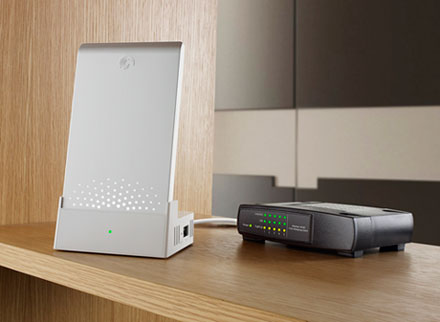Seagate FreeAgent DockStar NAS Device Review
Introduction and Design

Network-attached storage (NAS) devices come in all shapes and sizes; some even come without hard drives--with the intention that the users will add the drives themselves. There is even a relatively new category of NAS devices that don't have any internal drives at all, and instead use USB-attached drives as their storage source. These NAS devices are typically inexpensive and super-easy to setup and use. We've even looked at a couple of them: the Addonics NAS Adapter ($49) and CloudEngines' Pogoplug ($99).
Now a big name in the storage business, Seagate, has jumped onto this bandwagon and released its own USB drive-based NAS device, the Seagate FreeAgent DockStar. Instead of reinventing the wheel, however, Seagate chose to license the Pogoplug technology from CloudEngines and integrate it--with a few differences--into the DockStar. The most obvious difference between the Pogoplug and the DockStar is their appearance. While the Pogoplug is essentially a small white cube, the DockStar is a bit more svelte (3.39x3.351.50), with a cradle on top designed to work exclusively with Seagate's line of FreeAgent Go portable hard drives--in fact, the DockStar looks a lot like the Seagate FreeAgent Go Dock. Another major difference between the DockStar and the Pogoplug is that the DockStar has a total of four USB 2.0 ports versus the Pogoplug's single USB 2.0 port. (You could use the USB port in the DockStar's cradle to connect to a drive other than a FreeAgent Go drive, but you'd need to get your hands on a cable or adapter that has a female mini-USB port.)
Under the hood, both the DockStar and the Pogoplug are actually fully-functional Linux-based computers: They are system-on-chip (SoC) device, based on Marvell's SheevaPlug Development Kit. As such, the Pogoplug is easily modifiable via SSH shell access, where users can add additional functionality to the device, such as adding iTunes server or BitTorrent functionality (unlike other more full-featured NAS devices, the DockStar and Pogoplug lack these features). Seagate, on the other hand, appears to not want DockStar users to muck with the works--you can access the DockStar via SSH shell access, but without the password, you won't be able to get past the login prompt. (If Seagate ever makes the DockStar's SSH password public or someone figures it out, then the DockStar can conceivably be hacked to the same extent as the Pogoplug.)
Another difference between the DockStar and the Pogoplug is that after the first year of ownership, the DockStar requires a $29.99 yearly subscription fee in order to continue using the DockStar's file sharing and remote access features. The Pogoplug's $99 cost includes lifetime file sharing and remote access. The DockStar comes with a one-year subscription to the Pogoplug service; if you choose to not renew the subscription when it runs out, you can still keep using the DockStar as a NAS device on your local network, but you'll no longer be able to share files with other users over the Internet and you'll lose the ability to access the DockStar remotely.
It is the DockStar's file-sharing and remote access features, combined with how easy it is to use, that truly makes the DockStar such a compelling product. Users can easily make any sort of files available to other users, including photos, videos, and music. When you make content available, the DockStar can even automatically publish updates to social networking sites and publish RSS feeds. By routing these features through the Pogoplug service, all content is available via a Web interface, and you don't need to concern yourself with doing any port routing on your router or even fuss with setting up a FTP server.
The DockStar can be accessed via the Pogoplug Web-based interface or directly from systems running the Windows, Mac, or Linux operating systems after downloading and installing client software from Pogoplug.com. In addition to four USB 2.0 ports, the DockStar has a Gigabit Ethernet port. The DockStar is covered by a one-year warranty. And for those carefully watching their carbon footprint, the DockStar comes in fully-recyclable packaging.













